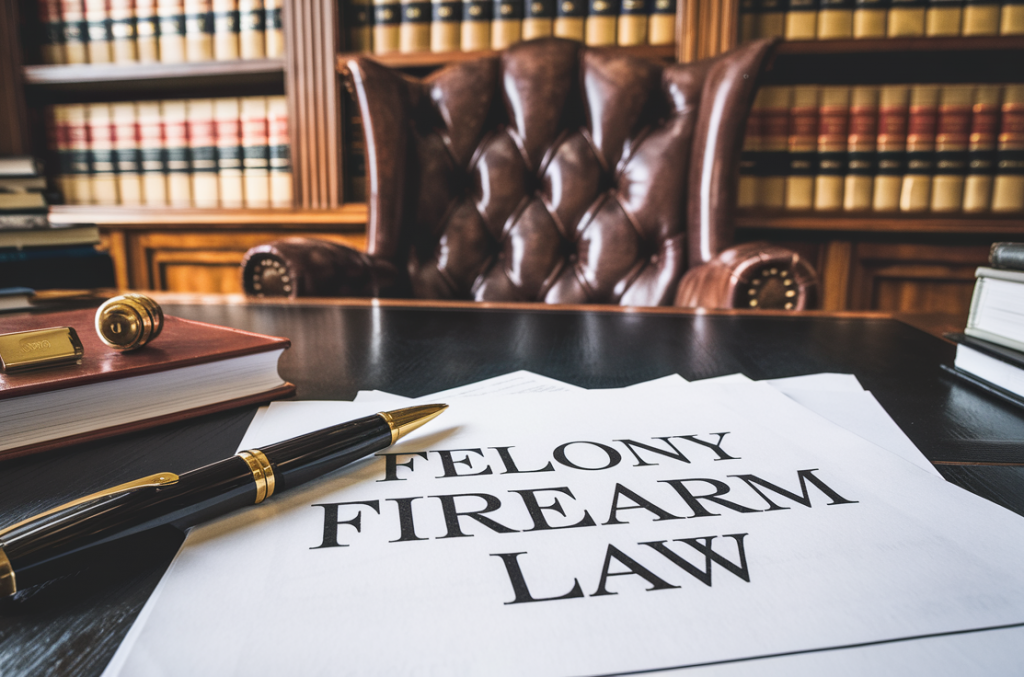Felony Firearm Defense Attorneys
Michigan’s Felony Firearm Statute brings harsh penalties for those accused of using a firearm in the commission of a felony.

Michigan’s Felony Firearm Statute
Michigan’s Felony Firearm statute, MCL 750.227b, is a significant piece of legislation that deals with using or possessing firearms during the commission of a felony. Here are the critical aspects of this statute:
- Fundamental Prohibition: The statute makes it a separate and additional felony to carry or possess a firearm while committing or attempting to commit a felony.
- Mandatory Sentence: One of the most notable aspects of this statute is the imposition of a mandatory sentence. If convicted under this statute, an individual is subject to a mandatory two-year prison sentence for the first conviction. This sentence must be served consecutively, i.e., before the sentence imposed for the underlying felony.
- Subsequent Convictions: Under this statute, the mandatory prison sentence is increased for second or subsequent convictions. The term for a second conviction is five years, and for a third or subsequent conviction, it is 10 years. These enhanced penalties reflect the seriousness with which Michigan law treats repeat offenses involving firearms.
- No Suspension or Probation: The statute specifies that mandatory sentences cannot be suspended. Also, probation is not allowed for the mandatory two-year (or more, in case of subsequent convictions) sentence.
- Application Regardless of Firearm Use: It’s important to note that the statute applies whether or not the firearm was used or brandished during the commission of the felony. Merely possessing the gun during the commission of a felony is sufficient for this charge.
- Impact on Plea Bargaining: This statute can significantly impact plea negotiations in felony cases. Because of the mandatory sentence associated with a felony firearm conviction, it can be a critical factor in how defendants and their attorneys approach plea bargaining with prosecutors.
It’s essential for anyone facing charges under this statute to seek competent legal advice, as the consequences of a conviction are severe and mandatory. The application of this statute can be complex, especially in cases involving multiple charges. Legal representation is crucial in navigating the law’s intricacies and formulating an effective defense strategy.
Consecutive Sentencing
In legal terms, a consecutive sentence is when a judge sentences someone for two or more crimes, and they must serve the sentences one after the other rather than simultaneously, as with concurrent sentences. Consecutive means that a defendant must complete the term of the felony firearm sentence before beginning the term of the next. For instance, if someone is sentenced to three years for one crime and two years for another, and these are consecutive, the total time served will be five years. Consecutive sentences typically increase total incarceration time compared to concurrent sentences and are often used in cases involving multiple convictions or serious offenses.
The decision to impose consecutive sentences usually lies in the hands of the sentencing judge. In making this decision, judges may consider various factors, including the nature and severity of each crime, the defendant’s criminal history, and the specifics of each individual case. The use of consecutive sentences serves as a means of punishment and as a deterrent, particularly in severe or multiple offenses. The imposition of consecutive sentences can significantly impact a defendant, directly affecting the time they will spend in prison. This aspect of sentencing is crucial during plea negotiations and sentencing hearings, where the total potential time to be served can play a significant role in the decisions made by both the defense and the prosecution.

Defending Against Charges of Possessing a Firearm During the Commission of a Felony
Defending against charges of possessing a firearm during the commission of a felony, known as Michigan’s “Felony Firearm” statute, can be challenging due to the strict nature of this law. However, experienced criminal defense attorneys can employ various strategies to defend their clients. The choice of defense largely depends on the specifics of the case, including the evidence available and the circumstances of the alleged offense. Here are some potential defense strategies:
- Challenging the Possession Element: The defense may argue that the defendant did not actually possess a firearm during the commission of the felony. Arguing lack of possession could involve showing that the firearm was not on the defendant’s person or under their control at the time of the felony.
- Questioning the Presence of a Firearm: Attorneys might dispute whether a firearm was present at all during the commission of the alleged felony. Arguing there was not a firearm could involve challenging the credibility of witnesses or the reliability of the evidence that suggests a firearm was involved.
- Disputing the Felony Charge: Since the felony firearm charge is contingent on the commission of a separate felony, challenging the underlying felony charge can be a crucial defense strategy. If the underlying felony charge is dismissed or reduced, it can directly impact the felony firearm charge.
- Mistaken Identity or False Accusation: A defense may be that the defendant was mistakenly identified or falsely accused. Mistaken identity defenses could involve presenting alibi evidence or challenging the accuracy of witness testimonies.
- Unlawful Search and Seizure: If law enforcement discovered a firearm during an illegal search, the defense attorney could file a motion to suppress the evidence on the grounds that they obtained it in violation of the defendant’s Fourth Amendment rights.
- Lack of Intent: In some cases, demonstrating that the defendant lacked the intent to commit a felony or use a firearm during the commission of a felony can be a viable defense, depending on the specifics of the case.
- Coercion or Duress: If someone forced the defendant to commit the felony under threat or duress, this could be a defense. This strategy involves proving that the defendant’s actions were not voluntary but were instead the result of coercion.
- Insufficient Evidence: The defense may argue that the prosecution has not met its burden of proof. A beyond-a-reasonable doubt defense requires demonstrating that the evidence presented by the prosecution is insufficient to establish guilt beyond a reasonable doubt.
Each case requires a tailored approach based on its unique facts and circumstances. A skilled criminal defense attorney will evaluate all aspects of the case to determine the most effective defense strategy. Anyone facing such serious charges should consult with an experienced attorney who understands the complexities of Michigan’s firearm laws and the criminal justice system.
What to Look for When Hiring an Attorney
When hiring a criminal defense lawyer to defend against felony firearm charges in Michigan, certain qualities are essential for ensuring the best possible representation at a fair and affordable price. Firstly, look for an attorney with specific experience in handling firearm-related cases, as Michigan’s firearm laws are complex and require specialized knowledge. An attorney with a track record of successfully defending similar charges can navigate the intricacies of these laws more effectively. Additionally, it’s crucial to choose a lawyer who is knowledgeable about local court procedures and has established relationships within the local legal community, including prosecutors and judges, as this can be advantageous in the negotiation and litigation phases.
Equally important is finding a lawyer who is a skilled communicator, both in and out of the courtroom. Strong advocacy skills are a must, as your attorney will need to present your case compellingly before a judge and jury. Moreover, they should be approachable and willing to communicate with you openly, honestly, and frequently about your case, ensuring you are informed and involved in key decisions. A dedicated attorney will take the time to understand your situation fully, offer personalized legal strategies, and be committed to protecting your rights and interests.
Finally, look for someone who demonstrates a high level of professionalism, ethical standards, and a deep commitment to their clients. Considering these qualities will help you find a criminal defense attorney who can offer the robust, aggressive legal representation needed to navigate the complexities of felony firearm charges in Michigan.

Your Best Defense Against Michigan Felony Firearm Charges
Facing Michigan felony firearm charges can be a daunting and life-altering experience, but with the right legal representation, you can navigate these challenges with confidence. At LEWIS & DICKSTEIN, P.L.L.C., we ensure your rights are vigorously defended and bring unparalleled dedication and expertise to every case. Our experienced attorneys understand the complexities of Michigan’s firearm laws and are committed to providing you with the aggressive and personalized defense strategy you deserve. Remember, the stakes are high, and the right legal team can make all the difference. If you find yourself confronted with felony firearm charges in Michigan, don’t hesitate to contact us for a free consultation. We are here to stand by your side and fight for the best possible outcome, safeguarding your freedom and your future.
Call us today at (248) 263-6800 for a free consultation or complete an online Request for Assistance Form. We will contact you promptly and find a way to help you.
We will find a way to help you.
We Are Not Afraid to Win!
You should not take chances with just any lawyer when your freedom is at stake. You need the elite “go-to” firm of LEWIS & DICKSTEIN, P.L.L.C.













